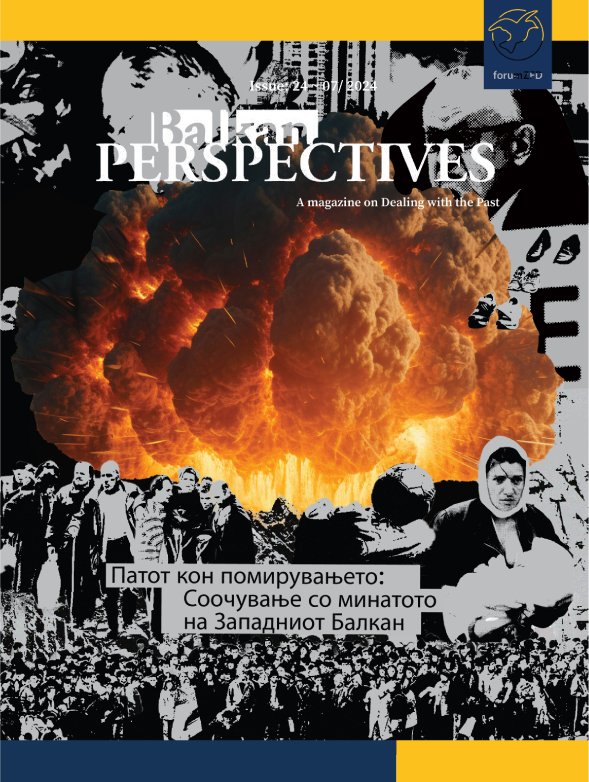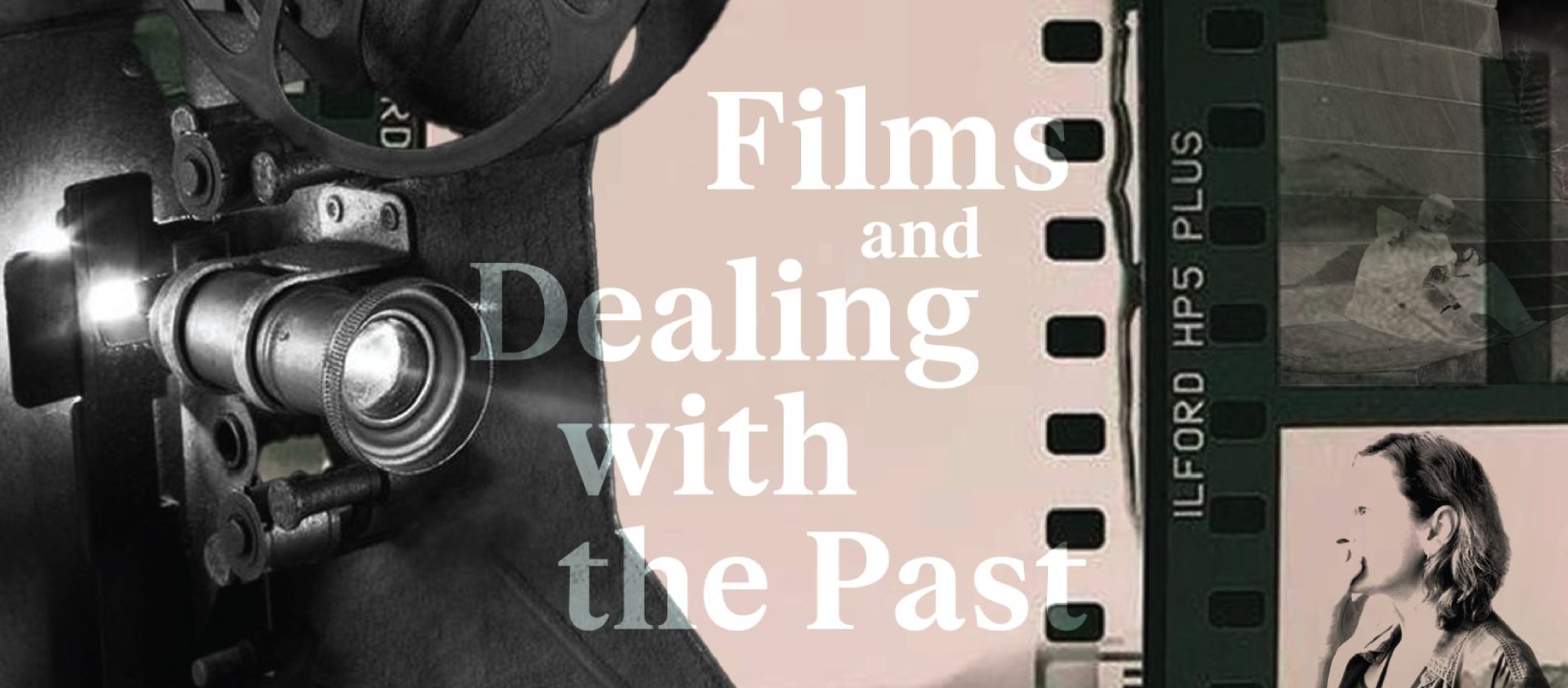

Number 25
Balkan.Perspectives #25
Films and Dealing with the Past
In this edition of Balkan.Perspectives, we explore film as a powerful medium for addressing the past. Film enables audiences to examine personal, cultural, and historical traumas, memories and conflicts. Through its lens, individuals and societies can confront difficult events, reflect on their legacies, and process emotions that may be hard to face directly. Filmmakers use narrative, symbolism, and visual storytelling to engage with complex histories, whether through historical dramas, documentaries, or personal stories.
In the article Beyond the Frame: Kosovo and Albanian Representations in Yugoslav Cinema, Arbër Qerka-Gashi examines the impact of simplified and exclusionary storytelling in films and its lasting effects on generations. Qerka-Gashi reflects on the discomfort of watching Boj na Kosovu (1989), which presents Kosovo’s history through a Serbian nationalist lens, excluding Albanian perspectives and undermining Kosovar Albanian identity. The film, like others from that era, depicts Albanians in a reductive, one-dimensional manner, reinforcing harmful stereotypes and erasing their historical presence.
In Aurela Kadriu’s text, the focus is on the political power of storytelling through film, particularly the documentary Fran and Verka: Or an Ordinary Day in an Abandoned Village. The film captures the daily lives of Fran and Verka, the last inhabitants of a deserted village in Kosovo, as an act of resistance against the erasure of marginalized stories. Kadriu explores how such “small stories” challenge the dominant narratives in the Balkans, which are often polarized by war and divisive ideologies, fostering understanding and unity in a fractured region.
Alen Šimić explores the relationship between film, war, and memory, highlighting film’s dual role as an art form and a tool of propaganda. The text critiques the overreliance on simplified narratives in Bosnian war films, where characters are often reduced to victims or villains. In contrast, it praises the authenticity and emotional depth of personal and documentary storytelling. Using examples like Quo Vadis, Aida?, the article argues that blending personal and collective war trauma in films fosters deeper audience engagement and more truthful portrayals.
In Dino Mustafić’s article, the focus is on the relationship between film, memory, and societal transformation, particularly in post-war Bosnia and Herzegovina. The text highlights how films like Remake and Grbavica address generational trauma and societal wounds, using intimate stories to unpack broader historical narratives and promote dialogue. Mustafić underscores the role of art as a guardian of freedom and a counter to propaganda, emphasizing that true artistic expression must rise above ideological agendas to inspire empathy and understanding.
Saša Ilić examines the suppression of critical art in Serbia, focusing on the works of filmmaker Ognjen Glavonić, whose films delve into the hidden crimes of the 1999 Kosovo war. Despite receiving international acclaim, Depth Two and The Load have faced state-driven marginalization, censorship, and propaganda labeling them as “anti-Serbian.” Ilić highlights how Serbia’s cultural and media apparatus repackages or erases challenging narratives to sustain nationalist myths and obstruct meaningful public dialogue about war crimes.
Ivana Matijević’s article explores how films from the former Yugoslav republics confront the region’s troubled past, using cinema to address historical and national traumas. Works such as Quo Vadis, Aida? and Dara from Jasenovac underscore a competition over victimhood, mirroring the broader political and cultural tensions that continue to shape the Balkans. While some films courageously confront crimes committed by their own nations, others focus on constructing national identities rooted in collective suffering.
In Toni Cifrovski’s article, recent Macedonian films addressing youth-related themes are explored, reflecting societal issues and generational concerns. Engaging young audiences while prompting broader societal reflection, these productions combine bold storytelling, striking visuals and powerful performances to address pressing cultural and emotional issues.
We are also excited to present our new Balkan.Perspectives Podcast series. You can listen and download the episodes on our website, www.dwp-balkan.org, or via Spotify, Google Podcasts, or Apple Podcasts. Special thanks to our partners, the production team, and our guests. In Bosnia and Herzegovina, thanks to Alen Šimić and tačno.net; in Kosovo, thanks to Kosovo 2.0 for facilitating a conversation with young filmmakers on history, family stories, and identity; in North Macedonia and in Serbia, thanks to Ivana Matijević and Pavle Simjanović and Liceulice FM – RadioAparat.
This edition features a regional podcast with Jakov Fendu, Aurela Kadriu, Ana Pejovic, and Artan Sadiku, who come together to explore, challenge, and discuss the theme of this issue — and much more.
The Balkan.Perspectives editorial team wishes you an engaging and enriching reading and listening experience.
On behalf of the Balkan.Perspectives editorial team,
Martin Filipovski
Editor-in-Chief
Impressum 25 – 01/2025
Editor in Chief: Martin Filipovski
Editorial Team: Martin Filipovski, Vera Ruljić, Zlatan Hajlovac, Luca Tesei Li Bassi, Aulonë Kadriu
Authors: Arbër Qerka-Gashi, Aurela Kadriu, Alen Simić, Dino Mustafić, Saša Ilić, Ivana Matijević, Toni Cifrovski
Podcasts: Bosnia and Hercegovina: Alen Simić and tačno.net, Kosovo: Kosovo 2.0, Serbia: Ivana Matijević and Pavle Simjanović for Liceulice FM – RadioAparat
Design (Cover page): Envinion
Translation: PLC Lingua (Albanian), Luna Đorđević (BHCS), Martina Kimovska (Macedonian)
Proofreading: PLC Lingua (Albanian/English), Zinaida Lakić (BHCS), Zanet Ristoska (Macedonian)
